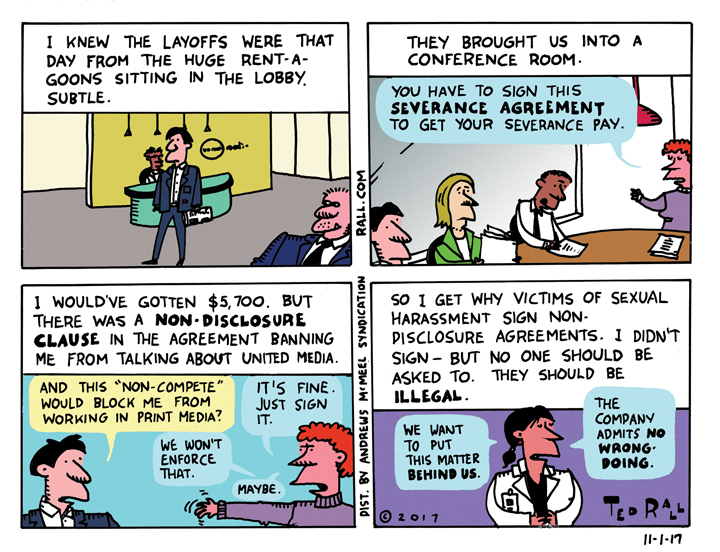People are wondering, why do the victims of Harvey Weinstein and other sexual predators agree to settlements that include a non-disclosure agreement? Because the pressure is too much to bear not to. Here’s my personal experience with an NDA and a suggestion of a solution.
The Trouble with NDAs

Ted Rall
Ted Rall is a syndicated political cartoonist for Andrews McMeel Syndication and WhoWhatWhy.org and Counterpoint. He is a contributor to Centerclip and co-host of "The Final Countdown" talk show on Radio Sputnik. He is a graphic novelist and author of many books of art and prose, and an occasional war correspondent. He is, recently, the author of the graphic novel "2024: Revisited."

5 Comments. Leave new
A corporation once interviewed me to fix a consumer product’s video screen power supply that not only failed catastrophically when it failed, but was not safe when powered down while the product’s power switch was turned OFF, so people died.
The only way a consumer could protect himself from a house fire when this product was not in use (like in the middle of the night while a family was sleeping and it was turned off) was to unplug its power cord.
A state capitol building had extensive damage caused by this failure, and yet no recall was made due to the non-disclosure agreements in settlements.
To make a claim that this problem existed would require sealed records to be made public, so to make that claim would have been both ineffective and also would have made me unemployable in the industry as a whistleblower.
When you live under a capitalist form of government, profit is almost always more important than people. Heroes are troublesome and hated.
Today, mostly victims are called heroes in corporate news, and almost never whistleblowers.
If you have a heroic bent and live in a culture that values sheep, don’t expect other sheep to come to your aid when the wolf attacks.
Expect schadenfreude from the sheep, joy at the misfortune that comes to the whistleblower who says what the other sheep already know but had the sheep-like sense to keep quiet about.
I was ‘invited’ to resign from Microsoft ‘voluntarily’ – with a nice severance package *provided* that I never spoke badly about the company, and agreed not to sue the bastards for my grievance or age discrimination either one. (Age discrimination? I never mentioned it – why would a company be worried about age discrimination? I mean, just because the median worker age is 27 and people over 40 get shuffled off into unattractive jobs….)
I said no. (paraphrased)
I’ve never been in such a situation, so I’ll admit I’m totally ignorant.
What could happen if one signs the NDA and then violates it?
(I was once told by an attorney that you cannot sign away your legal rights.)
An NDA typically contains speech to the effect that the wounded party (“the company”) can sue for damages. If Ted had talked about United Media, the burden would be on them to show how much money they lost specifically because of his actions.
While it’s very hard to prove damages of the sort – it’s not at all hard to file a lawsuit.
As an engineer, I’ve been asked to sign all sorts of NDAs (Don’t tell other people about our technology) – that one is reasonable. For some time employers tried to claim rights to *any* work the engineer did, even on his own time. That’s nowhere near reasonable and it’s been shot down pretty thoroughly in the courts.
Another one I’ve signed is to the effect that I can’t go work for a competitor for seven years. That can fall under the category you described, a former employer *cannot* keep you from getting a job.
Violating the NDA is a breach of contract. They can sue for repayment of the money, legal costs, and maybe other damages.
Also if the NDA involved a lawsuit or potential lawsuit (e.g. Sexual Harassment, Layoff) , you cannot go back and sue after violating it since you have already settled.